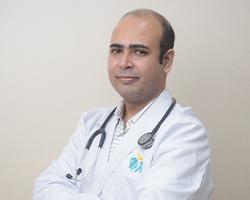Search Result: 7

Dr Kamal Chetri
MD; DNB; DM (GASTROENTEROLOGY; SGPGIMS)
Registration No
1244120
Language
English, हिंदी

17 years experience overall

Guwahati , Guwahati
MON- SAT(01:00 PM-03:00 PM)

Dr Mukesh Agarwala
MD(MED), DNB(GASTRO)
Registration No
1244122
Language
English, हिंदी

9 years experience overall

Guwahati , Guwahati
MON- SAT(03:00 PM-06:00 PM)

Dr Prashant Kumar Rai
MBBS. MD, DM (Gastroenterology)
Registration No
5592357
Language
English, हिंदी

9 years experience overall

Paschim Boragaon , Guwahati
MON- SAT, MON- SAT(09:00 AM-05:00 PM)

Dr Roshan Agarwala
MD,DM, Trained in Advanced Endoscopy, South Korea
Registration No
2039326
Language
English, অসমিয়া, বাংলা, हिंदी

7 years experience overall

Guwahati , Guwahati
MON- THU, SAT, MON- THU, SAT(10:00 AM-03:00 PM)

Dr Shubham Purkayastha
MBBS, MD, DM (Gastroentereology)
Registration No
4329115
Language
English, অসমিয়া, বাংলা, हिंदी

7 years experience overall

Paschim Boragaon , Guwahati
MON- SAT, MON- SAT(10:00 AM-05:00 PM)

Dr Mayank Agarwal
MBBS, MD(MEDICINE), DM(GASTROENTEROLGY)
Registration No
3979446
Language
English, অসমিয়া, বাংলা, हिंदी

20 years experience overall

Guwahati , Guwahati
MON- SAT(08:00 AM-09:30 AM)

Dr Pranjal Deka
"MBBS (Gold Medallist), MS, MCh FEBS (Multi Organ Retrieval & Liver Transplant) "
Registration No
1924207
Language
English

10 years experience overall

Guwahati , Guwahati
MON- FRI(09:00 AM-11:00 AM, 05:30 PM-07:00 PM)
Frequently Asked Questions for in Guwahati
The size of the appendix can vary greatly among individuals. On average, a healthy appendix may measure around 2 to 4 inches in length and less than 1 inch in diameter. However, there is no specific limit to its size as long as it remains healthy and functional.
The most common type of appendix is known as “retrocecal appendix,” which means it is located behind the cecum (the first part of the large intestine). However, the position and orientation of the appendix can vary among individuals.
For open appendectomy, the incision is typically made in the lower right side of the abdomen. The exact location may vary depending on the surgeon’s preference and patient factors. In laparoscopic appendectomy, several small incisions are made, usually in the lower abdomen.
The two types of appendix surgery are open appendectomy and laparoscopic appendectomy. Open appendectomy involves making a larger incision in the abdomen, while laparoscopic appendectomy uses smaller incisions and a camera to guide the surgical instruments.
No, once the appendix is removed during an appendectomy, it cannot grow back. However, in rare cases, a condition called “stump appendicitis” can occur if a small portion of the appendix is left behind during surgery.
While appendectomy is considered a common and routine surgical procedure, it should still be taken seriously. Untreated appendicitis can lead to life-threatening complications. The surgery itself carries some risks, but when performed by an experienced surgeon, the benefits usually outweigh the risks.
Stomach pains after weeks of appendectomy may be due to several reasons such as residual inflammation, adhesions (scar tissues), or other gastrointestinal issues unrelated to the surgery. It’s important to consult with your surgeon or primary care doctor to determine the cause and appropriate treatment.
Choosing the best hospital for appendectomy depends on various factors including the hospital’s reputation, the expertise of the surgical team, the availability of advanced technology, and patient reviews. It is recommended to seek treatment at a reputable hospital known for its surgical services.
The duration of an appendectomy procedure can vary depending on factors such as the surgical approach used, the complexity of the case, and any unexpected findings during surgery. On average, an appendectomy takes about 30 minutes to 1 hour.
Post-procedure care for appendectomy includes pain management, wound care, and a gradual resumption of normal activities. Patients are advised to avoid heavy lifting and strenuous activities for a few weeks. Follow-up appointments may be scheduled to monitor healing and address any concerns.
Preparation for an appendectomy may include fasting before the surgery, taking antibiotics, and undergoing certain tests such as blood work and imaging scans. Your surgeon will provide specific instructions based on your individual circumstances.
The recovery time for an appendectomy depends on various factors such as the surgical approach used (open or laparoscopic), individual healing abilities, and any complications. Depending on the individual case, most patients can resume normal activities within 1 to 3 weeks, but some patients may need a longer period of time to heal.
The success rate of appendectomy is generally high. When performed promptly and correctly, the procedure effectively treats appendicitis and prevents complications. However, individual outcomes may vary depending on factors such as the severity of the condition and any associated complications.
To find the best doctors for appendectomy, you can ask for referrals from your primary care doctor or seek recommendations from friends and family. It’s also important to consider factors such as experience, credentials, and patient reviews while choosing a surgeon.
A general surgeon performs an appendectomy. They specialize in performing various surgical procedures on different parts of the body, including the removal of the appendix.
A doctor who performs an appendectomy is typically a general surgeon. They have completed MBBS with a specialisation in surgery and specialised training in laparoscopic surgery, which is a minimally invasive technique often used for appendectomy.
Appendectomy is a surgical procedure to remove the appendix, a small organ located in the lower right side of the abdomen. This procedure is usually performed to treat appendicitis, which is inflammation of the appendix.
Possible complications after appendectomy are usually rare and minor. In rare cases, a condition called “stump appendicitis” can also occur if a portion of the appendix is left behind during surgery. However, most patients who have an appendectomy experience no complications, and the few who do usually recover quickly.
Related Procedures in Guwahati
- Doctors for Appendicitis in Guwahati
- Doctors for Inguinal Hernia in Guwahati
- Doctors for Incisional Hernia in Guwahati
- Doctors for Endoscopy in Guwahati
- Doctors for Colonoscopy in Guwahati
- Doctors for Umbilical Hernia in Guwahati
- Doctors for Whipple procedure in Guwahati
- Doctors for ERCP Stone Removal in Guwahati
- Doctors for Epigastric Hernia in Guwahati
- Doctors for Sleeve gastrectomy in Guwahati
- Doctors for Piles Surgery in Guwahati
- Doctors for Gallstones Removal in Guwahati
Related Treatments in Guwahati
- Doctors for Cirrhosis Treatment in Guwahati
- Doctors for Constipation Treatment in Guwahati
- Doctors for Crohns Disease Treatment in Guwahati
- Doctors for Gallstones Treatment in Guwahati
- Doctors for Irritable Bowel Syndrome Treatment in Guwahati
- Doctors for Portal Hypertension Treatment in Guwahati
- Doctors for Rectal Prolapse Treatment in Guwahati
- Doctors for Ulcerative Colitis Treatment in Guwahati
Other Specialities in Guwahati
- Best Urologist in Guwahati
- Best Pulmonologist in Guwahati
- Best General Physician in Guwahati
- Best Endocrinologist in Guwahati
- Best Cardiologist in Guwahati
- Best Oncologist in Guwahati
- Best Radiologist in Guwahati
- Best Orthopedics in Guwahati
- Best Hepatologist in Guwahati
- Best Gynecologist in Guwahati
- Best Dermatologist in Guwahati
- Best Gastroenterologist in Guwahati
- Best Psychologist in Guwahati
- Best Ent Specialist in Guwahati
- Best Nephrologist in Guwahati
- Best Rheumatologist in Guwahati
- Best Diabetologist in Guwahati
- Best Psychiatrist in Guwahati
- Best Neonatologist in Guwahati
- Best Dentist in Guwahati
- Best Dietitian in Guwahati
- Best Haematologist in Guwahati
- Best Pediatrics in Guwahati
- Best General Surgeon in Guwahati
Top Hospitals in India
- Hospitals in Ahmedabad
- Hospitals in Bangalore
- Hospitals in Bhubaneswar
- Hospitals in Bilaspur
- Hospitals in Chennai
- Hospitals in Delhi
- Hospitals in Guwahati
- Hospitals in Hyderabad
- Hospitals in Indore
- Hospitals in Kolkata
- Hospitals in Madurai
- Hospitals in Mumbai
- Hospitals in Mysore
- Hospitals in Nashik
- Hospitals in Noida
- Hospitals in Visakhapatnam
- Hospitals in Lucknow
- Hospitals in Bhopal
- Hospitals in Karur
- Hospitals in Kochi
- Hospitals in Nellore
- Hospitals in Trichy
- Hospitals in Kakinada
© Copyright 2024. Apollo Hospitals Group. All Rights Reserved.




 Call Now
Call Now







